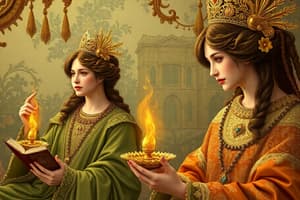Podcast
Questions and Answers
Which work is a hallmark of the Renaissance period in European literature?
Which work is a hallmark of the Renaissance period in European literature?
- The Canterbury Tales
- The Divine Comedy
- The Iliad
- Don Quixote (correct)
What theme is primarily explored in Modernist literature?
What theme is primarily explored in Modernist literature?
- Religious allegory
- Chivalry and heroism
- Philosophical inquiry
- Experimental writing and introspection (correct)
Which author is associated with the theme of existentialism?
Which author is associated with the theme of existentialism?
- Miguel de Cervantes
- Albert Camus (correct)
- Voltaire
- Dante Alighieri
Which period is marked by the creation of the epic poems 'The Iliad' and 'The Odyssey'?
Which period is marked by the creation of the epic poems 'The Iliad' and 'The Odyssey'?
What literary technique is primarily emphasized during the Romanticism period?
What literary technique is primarily emphasized during the Romanticism period?
Which of the following authors is known for their contributions to Realism?
Which of the following authors is known for their contributions to Realism?
Which literary period is defined by its focus on the impact of environment on characters?
Which literary period is defined by its focus on the impact of environment on characters?
What is a key characteristic of Medieval Literature?
What is a key characteristic of Medieval Literature?
Flashcards
Renaissance
Renaissance
A period of European history marked by a renewed interest in classical art, literature, and philosophy.
Modernism
Modernism
A literary movement that emphasizes experimentation with form and style, and an exploration of individual consciousness.
Existentialism
Existentialism
A philosophical movement that emphasizes the absurdity of life and the search for meaning in a meaningless universe.
Ancient & Classical Period
Ancient & Classical Period
Signup and view all the flashcards
Romanticism
Romanticism
Signup and view all the flashcards
Realism
Realism
Signup and view all the flashcards
Naturalism
Naturalism
Signup and view all the flashcards
Medieval Literature
Medieval Literature
Signup and view all the flashcards
Study Notes
Ancient and Classical Period (c. 800 BCE - c. 476 CE)
- Originated in ancient Greece and Rome.
- Renowned for epic poetry, highlighted by Homer's "The Iliad" and "The Odyssey."
- Latin literature also flourished, with Virgil's "The Aeneid" as a significant work.
Medieval Literature (c. 476 - c. 1500)
- Dominated by religious themes, chivalric ideals, and allegorical narratives.
- Key works include Dante Alighieri's "The Divine Comedy" and Geoffrey Chaucer's "The Canterbury Tales."
Renaissance and Enlightenment (14th - 18th centuries)
- The Renaissance sparked a revival of art, culture, and literary expression.
- Birth of the modern novel, exemplified by Miguel de Cervantes' "Don Quixote."
- Enlightenment philosophers like Voltaire and Rousseau examined social and philosophical issues.
Romanticism (late 18th - mid-19th centuries)
- Emphasized strong emotions, connection with nature, and the importance of individuality.
- Key literary figures include Johann Wolfgang von Goethe and Lord Byron.
- Notable works comprise Goethe's "Faust" and Byron's "Childe Harold's Pilgrimage."
Realism and Naturalism (mid-19th - early 20th centuries)
- Focused on realistic portrayals of everyday life and the influence of environment on characters.
- Prominent authors include Charles Dickens and Émile Zola, known for their realistic narratives.
Modernism (late 19th - mid-20th centuries)
- Characterized by experimental writing techniques and deep introspective themes.
- James Joyce's "Ulysses" and Franz Kafka's "Metamorphosis" highlight the complexity of modern existence.
Existentialism and Post-WWII Literature (mid-20th century)
- Explored profound themes regarding human existence and life’s absurdities.
- Significant literary works include Albert Camus' "The Stranger" and Günter Grass' "The Tin Drum."
Studying That Suits You
Use AI to generate personalized quizzes and flashcards to suit your learning preferences.




